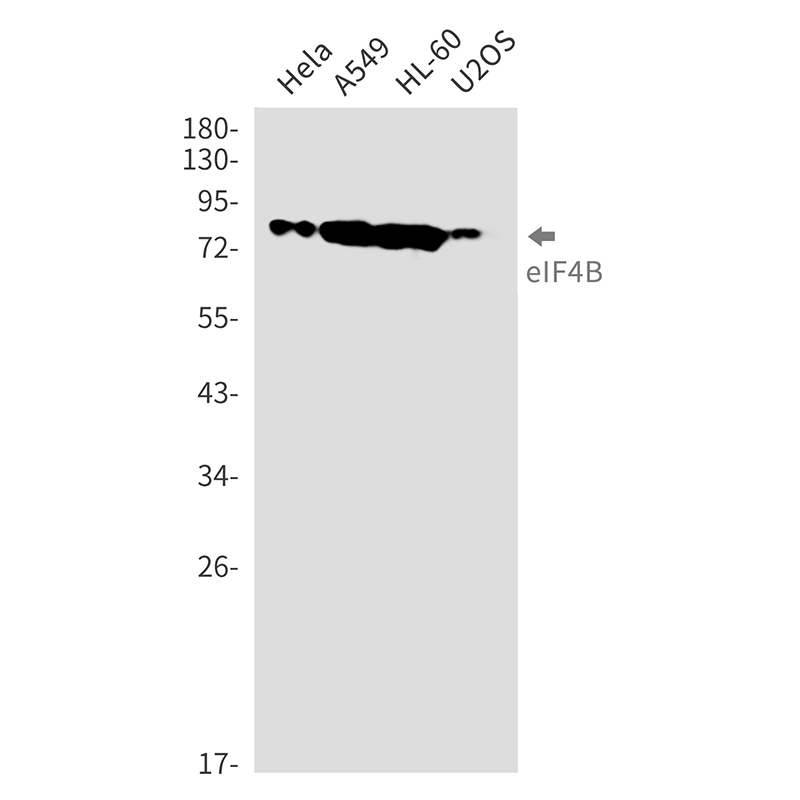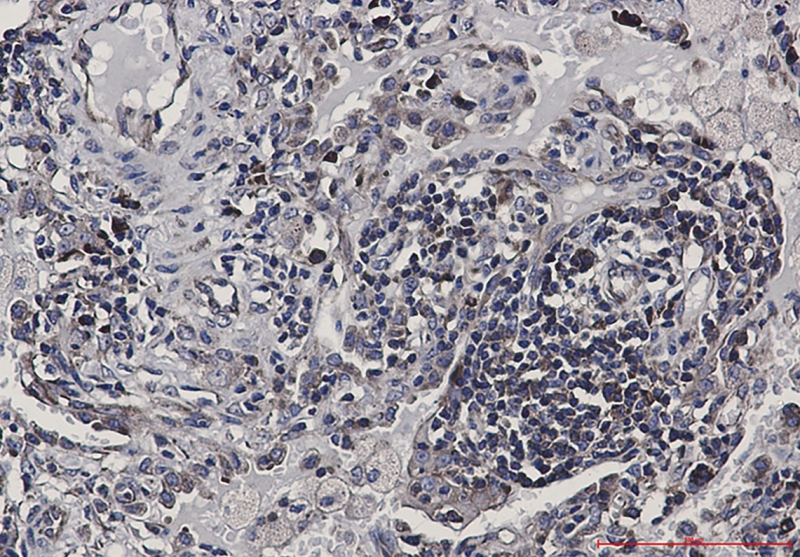

| WB | 1/500-1/1000 | Human,Mouse,Rat |
| IF | 咨询技术 | Human,Mouse,Rat |
| IHC | 1/50-1/100 | Human,Mouse,Rat |
| ICC | 技术咨询 | Human,Mouse,Rat |
| FCM | 咨询技术 | Human,Mouse,Rat |
| Elisa | 咨询技术 | Human,Mouse,Rat |
| Aliases | EIF-4B; PRO1843 |
| Entrez GeneID | 1975 |
| WB Predicted band size | Calculated MW: 69 kDa; Observed MW: 80 kDa |
| Host/Isotype | Rabbit IgG |
| Antibody Type | Primary antibody |
| Storage | Store at 4°C short term. Aliquot and store at -20°C long term. Avoid freeze/thaw cycles. |
| Species Reactivity | Human |
| Immunogen | A synthetic peptide of human eIF4B |
| Formulation | Purified antibody in TBS with 0.05% sodium azide,0.05%BSA and 50% glycerol. |
+ +
以下是关于eIF4B抗体的3篇参考文献(简化版):
1. **文献名称**:*"eIF4B phosphorylation regulates translational activation and stress granule assembly"*
**作者**:Mamane Y. et al.
**摘要**:研究揭示了mTOR和MNK通路通过磷酸化eIF4B调控其活性,促进核糖体结合mRNA并增强翻译起始。作者利用eIF4B抗体进行免疫印迹和免疫荧光,证明eIF4B磷酸化在应激颗粒形成中的关键作用。
2. **文献名称**:*"Phosphorylation of eIF4B by CDK1 drives translation of oncogenic proteins in melanoma"*
**作者**:Boussemou L. et al.
**摘要**:该研究发现黑色素瘤中CDK1介导的eIF4B磷酸化促进致癌蛋白(如Cyclin D1)的翻译。通过eIF4B抗体的ChIP-seq和免疫沉淀实验,揭示了其与特定mRNA的相互作用机制。
3. **文献名称**:*"eIF4B supports cap-independent translation mediated by viral IRES elements"*
**作者**:Holz M.K. et al.
**摘要**:文章证明eIF4B通过结合病毒IRES区域(如HCV和PV)增强无帽依赖性翻译。利用eIF4B抗体的敲低实验和免疫共沉淀,阐明了其在病毒复制中的必要性。
**注**:以上为示例文献,实际引用时需核对真实来源及内容准确性。
The eukaryotic initiation factor 4B (eIF4B) is a critical regulatory protein in mRNA translation initiation, playing a key role in binding RNA and facilitating ribosome recruitment during the formation of the translation preinitiation complex. It interacts with eIF4A, a DEAD-box RNA helicase, to unwind secondary structures in the 5' untranslated region (UTR) of mRNAs, promoting efficient scanning and initiation codon recognition. eIF4B activity is tightly regulated by phosphorylation, particularly at Ser422. mediated by kinases such as S6K1 (downstream of mTORC1) and MAPKAPK2 (activated under stress). These modifications enhance its RNA-binding capacity and helicase cofactor function, linking translation to cellular growth, proliferation, and stress responses.
Antibodies targeting eIF4B are essential tools for studying its expression, localization, and post-translational modifications in diverse biological contexts. They are widely used in techniques like Western blotting, immunofluorescence, and immunoprecipitation to investigate its role in physiological processes and diseases. Dysregulation of eIF4B has been implicated in cancer (e.g., via mTOR pathway hyperactivation), neurodegeneration, and viral infection mechanisms. Phospho-specific antibodies (e.g., anti-eIF4B Ser422) are particularly valuable for assessing its activation status in signaling pathways. These antibodies enable researchers to explore translational control mechanisms and evaluate therapeutic targeting of translation factors in pathologies like tumor progression or resistance to chemotherapy.
×